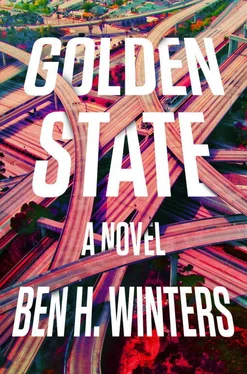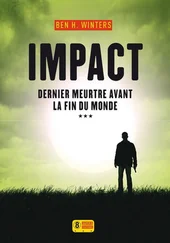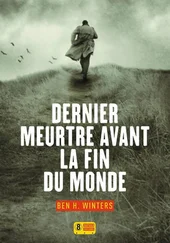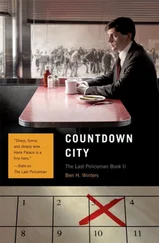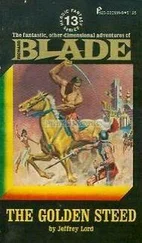I chase him. He is moving quicker than I’ve ever seen him, flying from narrow hallway to narrow hallway in the weak light. I follow his footfalls, follow his thin shadow. At the stairway shaft he turns and snarls, holding all the files up, clutching them to his chest like a shield.
“Do you know why they built the Record underground?”
There is a true answer to that question, as true as two and two, and I give it automatically: “Because there is infinite room for expansion.”
“No. Bullshit! It’s a metaphor. Everything is a fucking metaphor.” He holds the files out, over the side of the railing. A couple of pages slide out of the files, flap and flutter out into the empty air of the stairwell. “They built it belowground so everyone could walk around feeling like the truth was beneath their feet. You see? We—we here, I mean—we in this dumb and blinded land, we live our lives believing that beneath us there is foundation . That there is something there . Permanence. A record. ‘The Record.’ ” He puts the phrase in sneering quotes. “But it’s not so!” He flings one of the files downward, one of the three official versions of “The Death of Mr. Charles Ratesic of the Speculative Service.” I watch it as it flies and flutters and falls, spilling end over end into the descending darkness of the empty stairwell.
“Under us is nothing, Laszlo. Dear Laz. Nothing. ”
“And so what—what—” Fury of my own is rising. My body is trembling. My face bends into a snarl. “You want what? Nothing? You think it would be better to have no truth at all?”
“No. No, poor Laszlo. Dear Laz. Laszlo, my love.” He lets go another of the files and it flaps open, empties as it falls, its two wings bending upward like a bird’s. “Letting go of the fantasy of objective and provable truth would not be better or worse. It would be accepting reality and figuring out what to do next.”
There is only one of the three files left now. He holds it up. “Shall we open it, Laszlo? Shall we see what’s left? See what the truth ended up being?”
I don’t take the bait. I have taken too much bait, been too easily led. “You are under arrest, Arlo Vasouvian.”
“You’re not going to arrest me,” he says. “I already told you that. You will let me go, or you will shoot me dead.”
“How do you know?”
He smiles sadly, looks across the darkness. “I am only speculating.”
I’m not going to shoot him. I won’t shoot him. I won’t do that. I can’t. But I step toward him with the gun still raised, reaching for the cuffs on my belt. I am going to do this correctly. I will take him in. He will confess. The truth will be rebuilt. There must be a mechanism to do that. There must be a form that can be filled out, a process that can be initiated, to reconstitute that file, reinstitute the truth, remake reality as it was. There will be a way.
“It was her idea, you know,” says Arlo, as if something has just occurred to him. “To use you in this way. Once we had concluded that starting again with Off Record houses was too simple, too literal, too small. Once we had decided we needed to achieve something larger—to send a shiver through the bulwark, as they say. I needed someone to make that happen. It was her idea. This marvel of string pulling that brought you along.”
I stop. “Her”: Silvie? “Her”: Tester? Her—
He is watching me. Narrow-eyed, examining. Watching my face as this miserable new truth breaks through. “Ms. Paige.”
“Yes, Laszlo. Aysa is ours. She was always ours. Her parents were ours and so was she.”
I close my eyes. No more. I can’t take any more.
“I had told her all about you,” he says, “during her training. I told her all about brave Charlie’s poor kid brother who never measured up. This sad unfortunate younger brother, who doted upon and resented heroic Charlie in equal parts. And Aysa thought—it’s really quite remarkable—Aysa thought, well goodness. Perhaps this younger brother will be eager to finish what his brother began. How hungry he must be for his own moment in the sun. In the good and golden sun.”
I am shaking my head. I am back in the house on Mulholland, side by side with my junior partner, the two of us in silent wonder at the lies to which we were bearing witness, and not just witnessing but feeling, and not just feeling but seeing.
“But she saw them just like I did,” I tell Arlo. “She saw Petras’s lies and denials. The same as I did, she saw them.”
“You saw her say she felt Petras lying. You saw her say she saw it.”
I blink, trying to grab hold of my own memories, corner my own mind. I am not the hero, confronting the villain. I am a lost and tiny man, diminished and confused and uncertain. I am nothing.
“So she was, what, an actor? She was acting?”
“Actor.” “Acting.” Old words from an old world, concepts with dim ancient references, half hidden by time. The old world, not to be known.
“Yes. Just so,” says Arlo. “An actor. Like Crane, the roofer, whose name was really Ortega, by the way, except it’s not, not really. It’s Ortega, it’s Crane, sometimes it’s Mortenson. Once, for a week, we called him Joe Dill, just to see how that felt. He practiced so often how to throw himself off a roof and make it look like he fell. See? See, Laszlo? Can you imagine doing that? Just that moment of letting go, letting your body slide? To him it was worth it. Aysa allowed herself to be sacrificed, just like Crane, who taught himself to fall off a roof. And both of them knew what I know, which is that it was worth it. Worth it .”
“No. It can’t—none of this can be true.”
“Yes!” He laughs, a short burst of happy laughter, and brings his hands together. “Now you see it. That’s the whole point, Laszlo: that’s the whole point. Laszlo—Laszlo—” He rushes forward and grabs my arm, smiling, eyes wide with delight. “Laszlo—I’m not even standing here right now.”
“What—what are you talking about?”
“The figure you are talking to is a projection. I am hidden somewhere else in this building, preparing to make my escape.” He says it in a melodramatic voice, making a face, playing a game. “Unwilling to risk capture at this late moment in my long-planned scheme.”
“That’s impossible. That’s insane. Something out of a—”
“Out of a what, Laszlo?” He steps closer. “A novel? Why can’t it be true, Laszlo, if all the rest of it is true? I have power over stretches, I have power over people. Why not power over the air itself?”
“It’s a lie, Arlo.”
“Okay, then. So, can you see it?”
“See…”
“If it’s a lie, can you see the lie?”
I look wildly around the room. I step backward from Arlo and I look at the air around us and I don’t feel it and I don’t see it. No crackle in the atmosphere, no bending at the edges. Nothing.
“I’ll say it again, dear Laszlo. A firm declaration, posited as fact, that you say is not So.” He makes his hands into a bullhorn, trumpets it: “ I’m not really standing here. I’m a hologram . Well? Now? Are you discerning anything now?”
He says it with scorn, contempt, mocking the idea on which I have based my life.
“If I’m lying, you’d be feeling it, right? Right? ”
He’s right. I would see it in the air. Wavelets of telltale in the atmosphere, ripples in the very air—I would be feeling it, just as he says, and now I do not, now the air is crystalline and calm, just Arlo walking toward me saying he is not, after all, Arlo, proving his bastard point, showing me that I cannot trust in what I know. I am discerning nothing. I hold the gun steady, hold it up and straight.
Читать дальше
